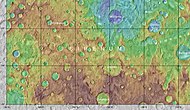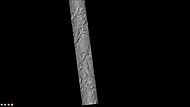Bernard (crater)
 Bernard crater based on day-time THEMIS image | |
| Planet | Mars |
|---|---|
| Coordinates | 23°24′S 154°12′W / 23.4°S 154.2°W |
| Quadrangle | Memnonia |
| Diameter | 128 km |
| Eponym | P. Bernard, a French atmospheric scientist |
Bernard is a large crater in the Memnonia quadrangle of Mars, located at 23.4° south latitude and 154.2° west longitude. It is 128 km in diameter and was named after P. Bernard, a French atmospheric scientist.[1] The floor of the crater contains large cracks, which may be due to erosion.
Impact craters generally have a rim with ejecta around them, in contrast volcanic craters usually do not have a rim or ejecta deposits. As craters get larger (greater than 10 km in diameter) they usually have a central peak.[2] The peak is caused by a rebound of the crater floor following the impact.[3] If one measures the diameter of a crater, the original depth can be estimated with various ratios. Because of this relationship, researchers have found that many Martian craters contain a great deal of material; much of it is believed to be ice deposited when the climate was different.[4] Sometimes craters expose layers that were buried. Rocks from deep underground are tossed onto the surface. Hence, craters can show us what lies deep under the surface.
-
Map showing the relative positions of Bernard Crater and other nearby craters in Memnonia quadrangle
-
West side of Bernard Crater, as seen by CTX camera (on Mars Reconnaissance Orbiter).
-
Close-up of part of floor of Bernard Crater, as seen by CTX camera (on Mars Reconnaissance Orbiter).
-
Close-up of part of floor of Bernard Crater showing troughs and dust devil tracks, as seen by CTX camera (on Mars Reconnaissance Orbiter).
-
Bernard Crater Floor, as seen by HiRISE. Large cracks are visible on floor.
-
Troughs on the floor of Bernard Crater showing many boulders, as seen by HiRISE under HiWish program
-
Troughs on the floor of Bernard Crater, as seen by HiRISE under HiWish program
See also
[edit]References
[edit]- ^ "Bernard (crater)". Gazetteer of Planetary Nomenclature. USGS Astrogeology Research Program.
- ^ "Stones, Wind, and Ice: A Guide to Martian Impact Craters".
- ^ Hugh H. Kieffer (1992). Mars. University of Arizona Press. ISBN 978-0-8165-1257-7. Retrieved 7 March 2011.
- ^ Garvin, J., et al. 2002. Global geometric properities of martian impact craters. Lunar Planet Sci. 33. Abstract @1255.





